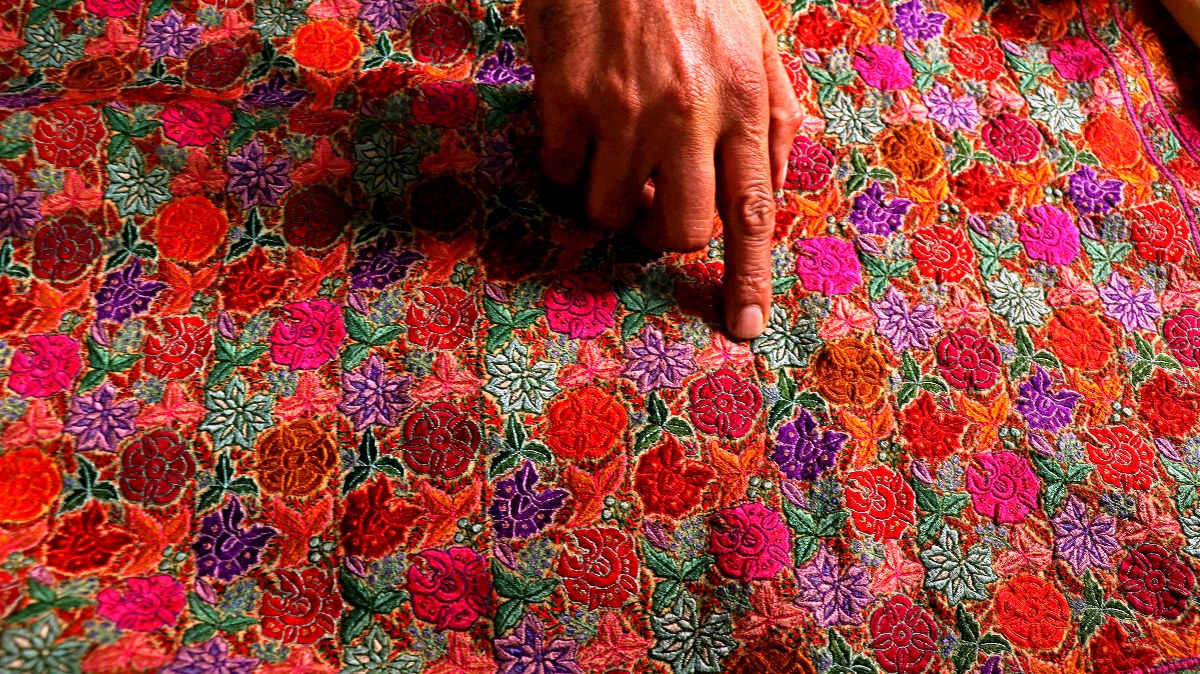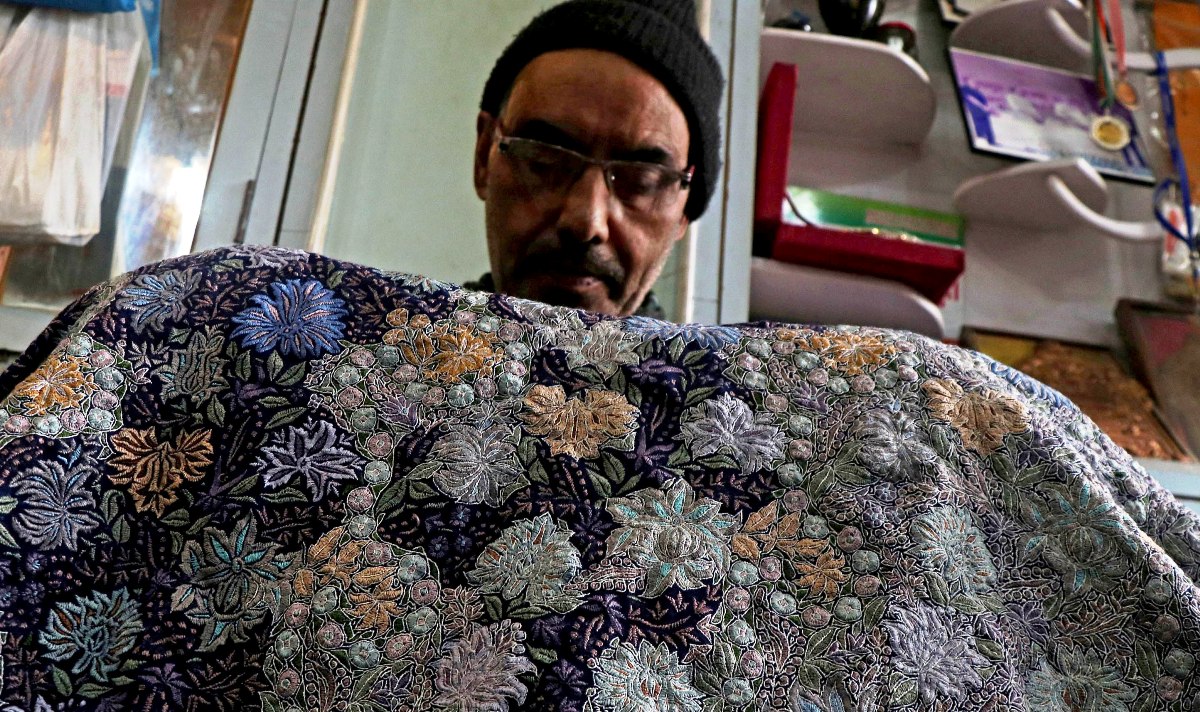A master craftsman died within months after a British organisation was awarded for the intricate design he displayed at an exhibition. Years later, his elder brother decided to pick the complicated art of his brother and finished the job six years later. The very expensive shawl, however, is not on sale and is being retained by the family as an emotional and artistic reunion of the two brothers, reports Bilal Bahadur and Masarat Nabi
Kashmir’s shawl weaving is acknowledged globally. However, certain anecdotes revolving around some of the very special shawls are not in public knowledge. These stories could be as true with the shawls carrying the map of Srinagar city as it is true with certain complicated designs that were associated with certain master artisans. Recently, one such shawl made news for an interesting development.
An artisan known for his intricate design work died within months after he started working on a pattern and it was approved by a buyer for its intricate and very expensive design. He left the shawl half-finished as the death does not keep a calendar, unlike a work schedule. For a long time, nobody could touch the shawl. Finally, the family decided that they need to pick up the threads and complete it. It took years and last month the shawl was completed.
This is the story revolving around Shabir Ali Beigh, a master artisan known for his intricate patterns. In his lifetime, he made his presence felt within and outside Kashmir. He bagged all the awards at the state and national levels. Besides, he received the best of the best award at The Art in Action Award from Oxford University Press in 2007.
“His work was recognised by this award, in a competition where more than 3500 artisans from around the world had come to demonstrate their works,” his brother Mehboob Ali said. “Shabir Ali got the first prize for his Kani Sozni work.”
Within a few months after his return from London, Shabir Ali died. This left his work unfinished.
“One day, I received a call from the Arts and Action Museum asking for the shawl position, and I told them Shabir Ali was no longer alive,” Mehboob said with moist eyes. “They wanted me to give them the shawl cutting and his needle so that they could preserve it in their museum. I suggested they recognise my brother’s work and put his name and state on the (unfinished) shawl, but they didn’t agree. I refused to give them the unfinished work.”
It was after this acrimonious conversation with the British museum that Mehoob’s family decided to complete the unfinished work and make the award-winning design a complete story. It proved to be a challenging task.
“At first, I was unable to understand how my brother had worked on that shawl, but I did not give up,” Mehboob said. “It took me almost a year to understand how he had used the thread in designing the intricate pattern, and when I finally finished the shawl, I felt a great sense of accomplishment.”
Mehboob said it took him around 6 years to complete the shawl. “This was a huge work and this helped me understand the intricacies involved in the craft.”

The Father
Now Mehboob is an extraordinary artisan. Living in Srinagar’s Zadibal, he speaks proudly of his craft and the inheritance of knowledge. He is a proud third-generation artisan.
His father, Ali Mohammad Beigh specialised in weaving pashmina shawls and mastered the art of sozni. This led him to get a number of honours. In 2006, he received the Shilp Guru Award for his work on ten samples of shawls. Conferred upon master craftspersons in recognition of their excellent craftsmanship, product excellence, and their roles as gurus in the continuance of crafts to other trainee artisans as a vital part of the traditional heritage of India, Shilp Guru Awards was given to him by Vice President Jagdeep Dhankhar in 2002. Given as part of the Golden Jubilee of the resurgence of handicrafts in India, the award carried a gold coin, Rs 2 lakh prize money, a tamrapatra, a shawl, and a certificate. A respected artisan, he won the state award in 1984 and the national award in 1992.
The Sons
While mastering the art, Ali Mohammad passed down his knowledge to his two sons, Mehboob Ali and Shabir Ali. They improved upon the knowledge and experience they inherited and also aged all the awards.
Mehboob, for instance, received three state awards in 1987, 1988, and 1989. In 1996, he got national awards for his work on a Jamawar shawl and another national award for Sozni in 1997.
Working diligently, Mehboob has achieved a level of mastery and is being considered matchless among his peers. “We are illiterate, but this art has given us everything – pride, dignity, and a sense of accomplishment,” Mehboob said. “Our work keeps us so engrossed and busy that we don’t get time to think about other things.”
Apart from finishing a challenging work that his brother left unfinished, Mehbooba has his own anecdotes. “The index finger of my left hand has a visible mark developed by needle pricks while embellishing the shawls,” he said. “This is the occupational hazard so no regrets.”
Beighs have dedicated their entire life to Sozni embroidery. That is why, despite Shabir Ali’s absence, Mehboob’s passion and commitment to this craft never fade; they are not just working to earn a living but also working to keep the craft alive and vibrant. This art form has given them a sense of purpose and a source of pride. Mehboob hopes to pass down the knowledge to the next generation, almost following in the footsteps of his father.
By the way, Mehboob has decided not to give the Shawl to the British museum. He intends to retain it as the memory of his brother and not sell it. He said he is getting buyers for the product but will not sell it. Money apart, it is an emotional product that links him with his dead brother.
A Regret
Shabir left two sons behind – the elder one is a seventh-class student and the younger one is in the third primary. Mehboob is taking care of his brother’s family. He regrets that the system is cruel and inhuman. “If a government employee passes away, he still gets some kind of help,” Mehboob said. “What about us? We may not require financial help but at least somebody could have come to condole the death, a loss that was primarily ours but the art belonged to all of us and we had lost a major artisan.”

Mehboob regrets that the system is not sympathetic towards the artisan community. “Nobody looked towards the handicrafts during the two years of Covid19. It is my God that kept the families intact,” Mehboob said. “When the sales fell flat, we devised products for local consumption involving bag sewing and papier machie boxing for the weddings and that is how we could survive those two years for the meals.”
New Trend
The Covid19, he said, despite being trying proved a blessing in disguise. “After a very long time, the local market revived and now people are acquiring the Pashmina and Jamawar shawls the same way they acquire gold. This is a new trend that is on the surge. This trend is now a major source of income to the handicraft artisans,” Mehboob said. “People find the value of precious shawls almost like gold.”
Mehboob said he has been telling his family clients that he is willing to acquire all the kani shawls and Jamawal shawls at a cost higher than they paid when they bought them 20 or 30 years ago. “If somebody had purchased a shawl for Rs 50,000 from us, say 30 years ago, used it for all these years, I am willing to pay more to get it back,” Mehboob said, insisting he purchased a few. “This has led people to make comparisons between a Kani or a Jamawar shawl with the gold. People purchase gold and when they require money, they sell it but the buyer deducts some money. In the case of shawls – as long as they do not have damage, I do not deduct anything and instead, I pay more.”
Mehboob said he works with more than 300 artisans within and outside Srinagar and almost 25-30 artisans come to his workshop and work there in the daytime. “We are in Sozni and we work on any kind of material – sarees, pashmina, semi-pashmina, pherans and crewel and this is helping us keep our worker network busy, Mehbbob said. “The stress is there in the market but we are finding ways and eams to keep the workforce engaged.” He, however, asserted that the surge in the local market, especially during the wedding season, has emerged as a major support base for the artisans.
Content with the work he is doing, Mehboob said the new generation in the family is studying but it is unlikely that they will desert the sector. “Our children study, and get degrees but come back to the craft that we have inherited,” Mehoob said. “This is a craft that has been given to us by spiritual personalities and that is how we make best of the life even in challenging situations. We will live by the needlework, come what may.”
from Kashmir Life https://ift.tt/WzSZtTI
via IFTTThttps://kashmirlife.net
No comments:
Post a Comment